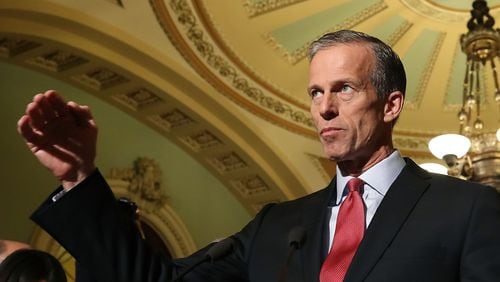Senate Republicans’ move to include in their tax reform bill a repeal of the requirement to have health insurance revealed numbers few people had noted before. (The mandate says that everyone must have coverage or face a fine.)
Sen. John Thune, R-S.D., said, “We’re taking a failed policy that punishes people with taxes — low-income people.”
In 2016, the fine for not having insurance was $695 for adults. The formula has a few wrinkles that brought the maximum penalty to $2,085 for a family, or 2.5 percent of income, whichever was larger. From now on, it rises with inflation.
Not everyone without insurance has to pay the fine. The list of exemptions is long. It includes a family with income under $20,800; people who have suffered domestic violence; anyone who has suffered the death of a close family member; someone who has received a utility shut-off notice, and more.
Thune's office said he got his information from 2015 data from the Internal Revenue Service.
In one key sense, Thune is correct. Out of all the tax returns sent to the IRS that included payment of the fine, 79 percent came from households making $50,000 a year or less. (Technically, the income is adjusted gross income, which understates actual income. But on average, the adjustment makes little difference for this check.)
Thune didn’t specify whether he was talking about the number of people or the dollars paid.
The government collected a little over $3 billion from about 6.6 million households. About $1.8 billion of it, 60 percent, came from households with incomes under $50,000.
So in dollar terms, about 60 percent of the tax fell on people in that income range, not the 80 percent that Thune said.
Thune’s communications staff told us he was talking about the number of people and the number of returns.
We reached several health care and tax researchers, and none challenged the core numbers.
But researchers found it odd that people making less than $25,000 had paid as much as they did. The $10,000 to $25,000 group accounted for 22 percent of the payments, and about 36 percent of the households.
“Folks are just making a mistake,” said Jonathan Gruber, one of the architects of Obamacare and an economist at the Massachusetts Institute of Technology. “Given the exemptions, there is no way such low-income folks should be paying.”
A just-released study from the Kaiser Family Foundation suggests the number of low-income people paying the penalty could be large. The report found that about 5 million uninsured people could get coverage for less than the cost of the penalty. Thanks to the subsidies in Obamacare, the lowest-level plans would be free to many of those people or available at a very low cost.
If everyone took advantage of those subsidies, the 6.6 million households paying the penalty because they lack coverage would fall significantly. We don’t know how the numbers would shake out because about 4 million people neither paid the fine nor told the IRS that they had coverage.
Republicans offer the repeal of the penalty as a boon to working Americans, and for some it would be. But the Congressional Budget Office, the nonpartisan analytic arm of Congress, has found that removing the penalty makes it less likely that people will seek insurance, even if it would be free or very affordable.
Our ruling
In terms of the number of returns in which people paid the fine, Thune’s figure is correct.
There’s strong evidence that many lower-income people are paying the fine by mistake, and millions could both avoid it and gain health coverage for less than the cost of the fine.
But as far as who is paying the fine, we rate this claim Mostly True.
“80 percent of the (individual mandate) tax falls on those who make $50,000 a year or less.”
— Sen. John Thune, R-S.D., on Wednesday, Nov. 15, 2017 in an interview on Fox News






